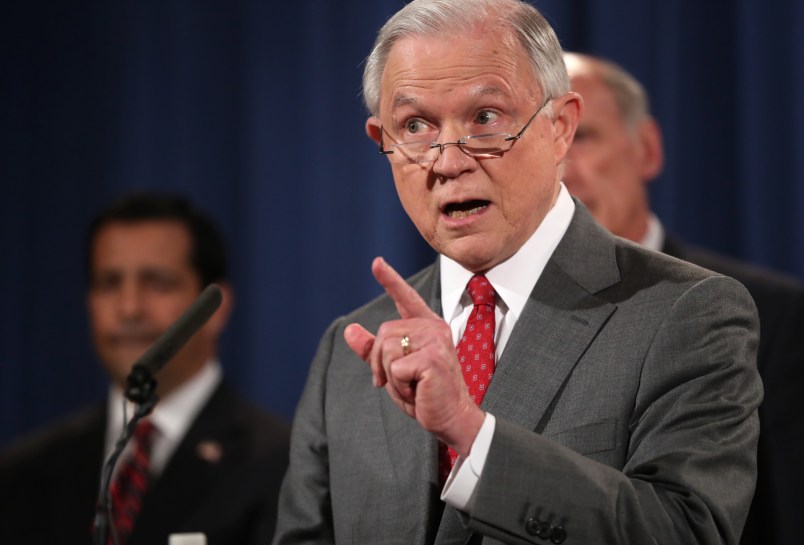Attorney General Jeff Sessions and Director of National Intelligence Dan Coats on Friday delivered a warning to potential leakers of intelligence information: “Don’t do it.”
“Those disclosures have been disseminated to both the media and to our foreign adversaries,” Coats said from the Justice Department. “Let me be absolutely clear this morning. These disclosures have resulted in a major threat to our national security.”
Coats noted that criminal leaks have not come out of the intelligence community alone, but also the executive branch and Congress. The National Counterintelligence and Security Center had been tasked with making “recommendations to strengthen the security clearance process,” he said.
The press conference announcing the DOJ’s crackdown on intelligence leaks came a day after the Washington Post published full transcripts of phone calls between Trump and the leaders of Mexico and Australia, respectively. President Donald Trump has ceaselessly criticized his attorney general in recent weeks, including for being “very weak” on investigating leaks.
Sessions on Friday emphasized that he had invested resources into addressing the issue, saying the agency “has more than tripled the number of active leak investigations, compared to the number pending at the end of the last administration,” he said.
The attorney general outlined three steps to combat the leaks: directing Deputy Attorney General Rod Rosenstein and FBI Director Christopher Wray to oversee all leak investigations; instructing the DOJ’s National Security Division and U.S. attorneys to prioritize leak investigations; and increasing resources devoted to leak investigations, including by creating a “new counterintelligence unit” within the FBI to address them.
He also said that, at the suggestion of “career investigators,” he would be “reviewing policies affecting media subpoenas,” hinting at a pursuing journalists in court in order to reveal their sources.
“We respect the important role that the press plays and we’ll give them respect, but it is not unlimited,” Sessions said.
Neither Sessions nor Coats responded to a shouted question from a reporter: “Do you plan to prosecute journalists?”
Speaking to reporters after the press conference, Rosenstein said that the review of subpoena policy was part of a “fresh look” and that “leaks to the media are not whistleblowing,” according to the Washington Examiner. He said he would “consult” with the News Media Dialogue Group, a group of media representatives established during the Obama administration, on potential changes.
Rosenstein would not rule out changing the department’s practice of not prosecuting journalists, calling it a hypothetical question, according to CNN.
Journalists were subpoenaed during George W. Bush’s presidency as part of the investigation into the outing of Valerie Plame as a covert CIA operative. And the Obama administration used various tactics, including subpoenaing journalists and naming a Fox News reporter a criminal co-conspirator, in one instance, in attempts to reveal journalists’ sources.







This appears to be a dog and pony show for an audience of one.
Unless the ‘leak’ is of classified information, there is no crime, correct? It may be a violation of one’s employment agreement to share confidential information, but that’s not the business of the DOJ. That’s an HR problem.
Were the transcripts of the phone calls with the Mexican pres and Australian PM classified?
You think you’ll get them to reveal their sources?
You won’t, Sessions and they don’t have to.
Witch hunt, witch hunt!
Ha ha!
Great news! They can start with the leaker-in-chief and his catastrophic betrayals of top-secret information directly to the Russians, and …
Oh, wait.
Ku Klux Keebler couldn’t find a leak if his tiny little life depended on it. And it does…